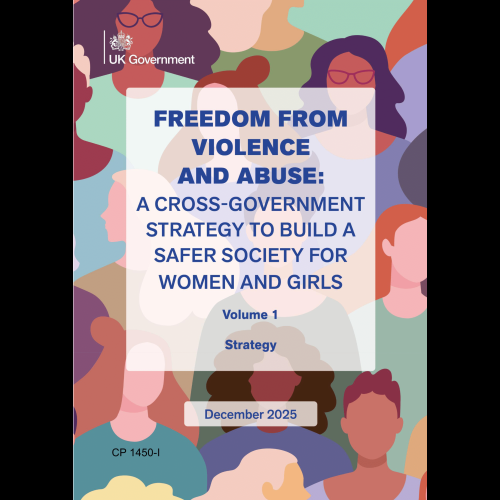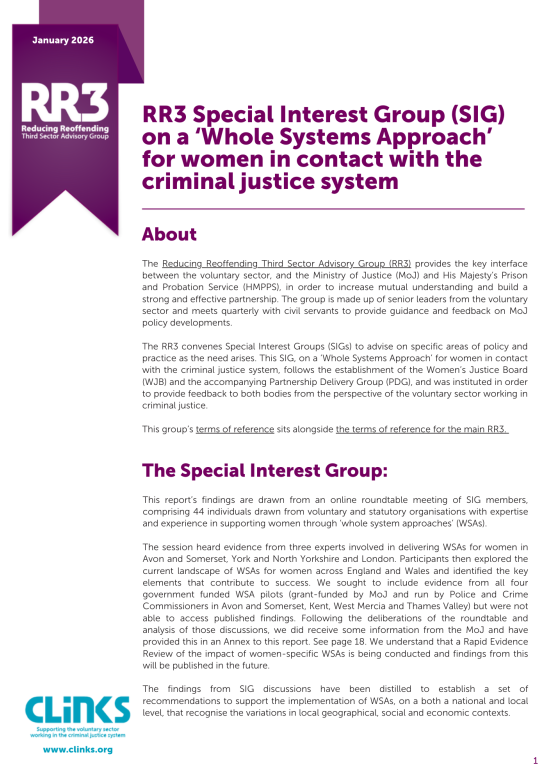Will the Ministry of Justice’s programme to review probation address the issues women-centred services have faced under Transforming Rehabilitation?
The voluntary sector plays a vital role in supporting women on probation. Through Clinks’ engagement with the sector at our women’s networking forum and from our research into the impact of the Transforming Rehabilitation (TR) reforms on the voluntary sector, we know that the reforms have created significant challenges for women’s organisations and for many have negatively impacted the delivery of their services.
The Ministry of Justice (MoJ) is now conducting a review of probation services and Clinks has held a series of events with the voluntary sector to gather their views and inform our consultation response. This blog looks specifically at the impact of the TR reforms on women’s organisations, and what challenges and opportunities may be on the horizon as a result of the MoJ’s programme to redesign them.
Ensuring sustainable funding
Voluntary specialist women’s organisations provide vital holistic, women-centred support to meet the distinct and complex needs of women in contact with the criminal justice system (CJS). Many of these organisations provide their services outside of TR’s Community Rehabilitation Company (CRC) supply chains: 65% of all the voluntary organisations surveyed in our latest TrackTR research were not paid by probation services, despite regularly receiving referrals from prison and probation and working directly with service users under CRC and National Probation Service (NPS) supervision.
The women’s voluntary sector is made up of small, specialist organisations and the TR reforms have hit them particularly hard. TrackTR found that where the voluntary sector is involved in probation services, funding is typically reserved for larger organisations (those with an annual income of over £10 million were the only group more likely to be funded by a CRC than not). On top of this, even when they do receive funding from CRCs, women’s organisations reported as more likely than the voluntary sector as a whole to have to subsidise this. This is clearly an unsustainable situation.
TrackTR also found that women’s organisations were more likely than others to consider their funding agreement with CRCs to be at risk of failure, and those outside the supply chain even less likely to consider their funding sustainable. These challenges have created a culture that is eroding relationships, with women’s services more likely to report poorer relationships with CRC owners and less confidence in CRC contract management.
To compound the problem, we know that confusion over TR and a lack of clarity over what services CRCs and the NPS should be funding has led to disinvestment in voluntary sector organisations from other sources, including from charitable trusts and foundations.
These findings build on our last State of the sector report, which found that specialist services delivering tailored support, such as women-only services, were less likely to achieve full cost recovery on the contracts they deliver, and more likely to reduce their services compared to rest of the sector. 30% of organisations delivering a specialist service reported being at risk of closure - citing a lack of funding as the cause.
Maintaining quality services
The lack of sustainability and loss of services has, ultimately, impacted service users: 58% of the women’s organisations surveyed in TrackTR reported that service delivery had worsened under the reforms. Concerns were also raised during our voluntary sector consultation events about the lack of consistent provision of women’s services, with some areas said to be left with no specialised support at all, creating an unfair postcode lottery for women on probation. Our last TrackTR report, Under represented, Under pressure and Under resourced, recommends that the MoJ’s programme to review probation must set out an acceptable level of services, which should include an assessment of the services required to meet the needs of women and ensure these needs are reflected in CRC contracts.
Probation cannot be seen in isolation to the rest of the CJS. The Female Offender Strategy recently released by the MoJ aims to improve the collective approach to women in contact with the CJS, divert them from custody and tackle the underlying causes of their offending - although this is welcome, the level of funding promised is not enough to ensure the long-term sustainability of women’s organisations key to achieving these aims. We will continue to work on promoting the value and financial need of these organisations to ensure their sustainability.
Protecting a holistic approach
During our ongoing engagement events with women’s services, it was strongly felt by the sector that the volume-based and output-driven targets prioritised in a payment by results system clashes with the ethos, aims and work of women’s services. Delegates felt that the MoJ needs to develop outcome measures in partnership with voluntary organisations and emphasise quality of work over a tick box mentality. Measures should be reflective of the size of services, type of support and service user group and should take into account the often complex needs of the service users.
Furthermore the MoJ are proposing that CRCs focus more on core probation services in order to address the confusion created by TR. This however raises some concerns about what will constitute ‘core’ services and the potential impact of this on funding for women’s organisations. So far there is little clarity on this; the probation consultation document refers to accommodation, employment, and substance misuse as examples of what would be included in a core probation offer. But women’s services are designed to meet women’s complex needs with intensive, holistic models of support that may be far broader than these examples.
For example, their services often include support for trauma experienced before coming into the CJS. There is a risk that limited funding and contract requirements will pressure organisations into changing the design of, or scaling down, their services, with a knock-on impact on their service user’s recovery and desistance.
What next
It is important that the MoJ’s programme to review probation considers the distinct needs of women and ensures a gender and trauma-informed approach when designing the new system. To enable this to take place it is imperative that there is sufficient and sustainable funding available for small, specialist women’s organisations that provide essential services for diverse cohorts of women.
Clinks will use our research and the feedback from engagement with the sector to write our response. We want to encourage voluntary organisations to also submit their own response here. The deadline is 21st September 2018. The materials from the MoJ consultation events are available here.
What's new
Blogs
Violence Against Women and Girls (VAWG) Strategy Blog
Publications
RR3 Special Interest Group (SIG) on a ‘Whole Systems Approach’ for women in contact with the criminal justice system
The RR3 SIG drives a Whole Systems Ap
Latest on X
The role is for a leader from an organisation focused on racially minoritised people, with expertise in service delivery, policy, advocacy, or related areas in criminal justice. Racial disparities are present at every CJS stage. This role ensures these voices are central in shaping policy to help address and eradicate them. Apply by Mon 18 Nov, 10am. More info: https://www.clinks.org/voluntary-community-sector/vacancies/15566 #CriminalJustice #RR3 #RacialEquity

